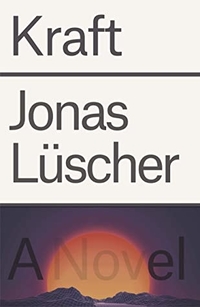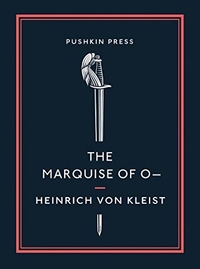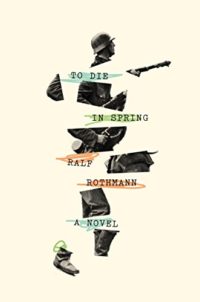What You Can See from Here by Mariana Leky
 Wednesday, June 23, 2021 at 6:37AM
Wednesday, June 23, 2021 at 6:37AM 
First published in Germany in 2017; published in translation by Farrar, Straus and Giroux on June 22, 2021
What You Can See from Here takes place in the German village of Westerwald. The story is narrated by Luisa, the granddaughter of Selma and Heinrich. She tells the story in three parts. The first focuses on the unsettled reaction of various villagers to the news that Selma dreamt of an okapi, a dream that always foretells a death. As they near the end of the time during which death is expected to claim one of them, the villagers tell each other truths that cannot later be unspoken.
The second part focuses on Luisa’s relationship with a Buddhist monk from Germany named Frederik who lives in a monastery in Japan. Frederik chats briefly with Luisa on a visit to Westerwald — she tells him every significant detail of her life in a single paragraph — and returns to spend time with her on a longer visit. Frederik gets to know all the villagers while doing his best (or not) to maintain a certain distance from Luisa. Whether the fate that brought them together will allow them to remain together is the novel’s plot driver.
The third part circles back to death, but this time death is presented not as something to fear, but as something to accept if everything goes smoothly, or even if it doesn’t. The love story of Luisa and Frederik is at least partially resolved, although perhaps not in a way that the reader will expect.
Luisa’s complicated family life adds to the novel’s humor. She never knew Heinrich, who built the crooked house in which she lives with her mother. Louisa’s father Peter is always traveling, perhaps in search of his father (a character points out that Heinrich’s death conveniently allows Peter’s search to occur anywhere in the world). Luisa’s mother is constantly fretting about whether she should leave Peter, suggesting an alternate explanation for Peter’s travels (“You can’t stay with someone who is always asking herself if she should leave you.”). She compromises by keeping company with the owner of the ice cream parlor, which isn't a bad choice.
We meet Luisa in her childhood when her best friend Martin is still alive. By the novel’s end, Luisa is in her thirties and the village is tolerating Martin’s father Palm, who has harnessed his demons but not his pain. Whether pain is meant to be endured or resolved is one of the novel’s themes, as reflected in the lives and experiences of several characters. Dr. Maschke believes that Peter suffers from encapsulated pain that is embodied in Alaska, a seemingly immortal dog that is devoted to Peter despite Peter’s rare appearances in the village. Palm learns to deal with his pain by boring villagers with quotations from the Bible. A villager named Marlies cannot bear company, including her own, but the villagers watch out for her despite her rejection of their companionship.
Death is obviously an additional theme, as is love. Luisa’s mother suggests that Luisa has linked them in her mind — that her conception of love is a form of death. She tells Luisa that love and death are “slightly different,” in that “a few people have returned from the kingdom of love.” A character known only as the optician has a secret love for Selma that he cannot reveal because inner voices tell him not to take the chance. He tries to tell Selma of his love in hundreds of letters but never makes it past the first sentence or two, sentences that set up a proclamation he fails to deliver.
Apart from Selma’s dreams of the okapi, little hints of magic appear at significant moments — a quiet stream suddenly roars, a moon shines more brightly than usual. Things fall when Luisa tells a lie. Heinrich’s sister Elsbeth is a source of home remedies (resting your forehead on the forehead of a horse cures headaches) but she has no protection against death.
The story is seasoned with the magic of laughter. I particularly enjoyed the fact that anyone calling Frederik’s monastery needs to engage with six monks, none of whom speak English, before Frederik finally comes to the phone.
The novel approaches questions of meaning and philosophy with tongue in cheek. The optician is obsessed with the question, “Is it true that something can disappear if we try to see it, but can’t disappear if we don’t try to see it?” The question seems very Zen, but Frederik doesn’t know what to make of it. The optician eventually devises an answer that he regards as illuminating. Frederik isn’t so sure, but he’s open to people finding their own path to enlightenment.
What you should do with yourself is the novel’s (and perhaps Buddhism’s) central question. Selma thought that “staying put was always exactly right.” Peter promised to stay put before he decided to travel the world instead. Luisa has always assumed that she would stay put until Frederik tells her that she was made to travel the seven seas — a description of her purpose that Luisa immediately rejects. By the novel’s end, after Frederik and Luisa have been corresponding for ten years, Luisa needs to decide how she wants to live her life.
Readers who love offbeat stories with quirky characters might want to put What You Can See from Here on top of their reading lists. It’s funny, charming, and insightful without making an obvious effort to be any of those things.
RECOMMENDED



